
Guests
Acclaimed author Gore Vidal’s new book is called “Imperial America: The United States of Amnesia.” We spoke with Vidal recently about the Bush administration, historical memory and 9/11. [includes rush transcript]
Gore Vidal is one of America’s most prolific and best-known writers. He has written more than 22 books and more than 200 essays. A collection of his essays won the National Book Award in 1993.
Vidal is the author most recently of Perpetual War for Perpetual Peace and Dreaming War: Blood for Oil and the Bush-Cheney Junta. Taken together, the books constitute a comprehensive attack on America’s imperialist ambitions and the military-industrial complex.
Writing in The Scotsman, critic Gavin Esler called Perpetual War “the finest serious critique of America’s use and abuse of power in the 21st century that I have read.”
I had an opportunity to speak with Vidal recently. We’re going to play some of that interview. He begins by discussing his thoughts about the United States post-9/11.
Transcript
AMY GOODMAN: We turn now to Gore Vidal, current—concerned about the events of September 11th and many of the unanswered questions. He has a new book out now. It’s called Imperial America: Reflections on the United States of Amnesia. Gore Vidal, the author of 22 novels, five plays, many screenplays, more than 200 essays, his United States: Essays 1952-1992 is one of the great American books of the 20th century, won the National Book Award in 1993.
I recently sat down with Gore Vidal to talk with him about where he was on September 11th.
GORE VIDAL: Where I was on 9/11, I was south of Naples in a town called Ravello. And I turned on CNN, and the first thing I saw was a plane going into a tower. And I knew that something dreadful had happened.
AMY GOODMAN: And what were your thoughts as the hours unfolded?
GORE VIDAL: Who? What? Why? I’m still wondering who, what, why, since nobody else bothers with those three questions. It’s the only three questions which should ever have bothered us.
I assume it was Osama bin Laden, an Arabian. I assumed it was the people that they say were the hijackers, who were mostly Arabians from Saudi Arabia. And why, I have been trying to work out ever since, and what, I’ve been trying to work out. In a normal country, this would have all been investigated by the Congress, by our various secret services, police services. The United States is not a normal country. We are under—we’re a homeland now, under military surveillance and military control. The president asked the Congress right after 9/11 not to conduct a major investigation, “as it might deter our search for terrorism, wherever it may be in the world.” So Congress obediently rolled over.
There was—I remember Pearl Harbor. I was a kid then. And within three years of it, I had enlisted in the Army. That’s what we did in those days. We did not go off to the Texas air force and hide.
I realized the country has totally changed, that the government is not responsive to the people, either in protecting us from something like 9/11, which they should have done, could have done, did not do, and then, when it did happen, to investigate, investigate, investigate. So I wrote two little books, one called Perpetual War for Perpetual Peace, in which I try to go into the why Osama bin Laden, if it were he, or whoever it was, why it was done. And I wrote another one, Dreaming War, on why we were not protected at 9/11, which ordinarily would have led to the impeachment of the president of the United States who had allowed it to happen. They said they had no information. Since then, every day the New York Times prints another mountain of people who said they had warned the government, they had warned the government. President Putin of Russia, he had warned us. President Mubarak of Egypt, he had warned us. Three members of Mossad claim that they had come to the United States to warn us that sometime in September something unpleasant might come out of the sky in our direction. Were we defended? No, we were not defended. Has this ever been investigated? No, it hasn’t. There was some attempt at the midterm election. There was a pro forma committee in Congress, which has done nothing thus far. What are we? Three years later. This is shameful.
The media, which is controlled by the great conglomerates, which control the political system, has done an atrocious job of reporting, though sometimes good stories get in. I’ve worn my eyes out studying the Wall Street Journal, which despite its dreadful editorial policies, is a pretty good newspaper of record, which the New York Times is not. If you read the Wall Street Journal very carefully, you can pretty much figure out what happened that day.
At the time of the first hijacking, according to law, FAA, it is mandatory, within four minutes of a hijacking, fighter planes from the nearest airbase, military base, go up to scramble. That means go up and force the plane down, find out who they are, find out what’s happening. For one hour and 50 minutes, I think it was, no fighter plane went up. During that hour and 20 minutes, we lost the two towers and one side of the Pentagon. Why didn’t they go up? No description from the government. No excuse. A lot of mumbling stories, which were then retracted, and new stories replaced them. That, to me, was the end of the republic.
We no longer had a Congress which would ask questions, which it was supposed—in place to do, of the executive. We have a commander-in-chief who likes strutting around in military uniform, which no previous commander-in-chief ever did, as they’re supposed to be civilians keeping charge of the military. This thing is surrealistic now, and it is getting nastier and nastier as we are more and more kept in the dark about those things which most affect us, which are war and peace, prosperity and poverty. These are the main things that a government should look after and we, the people, should be told about. We have been told nothing. And every voice is silent.
So I wrote two little books, which were then noticed by people who like to look at the internet, and then a few hundred thousand people have bought them. And I don’t come out with conspiracy theories. I never became a journalist. I’m a historian. Because journalists give you their opinions and pretend they’re facts. I don’t give you my opinions, because they may be valuable to my mother, but they are of no value to anybody else. They may be of value to me. But I give the facts as I find them, and I list them. And they’re quite deadly.
This government is culpable of, if nothing less, negligence. Why were we not protected? With all the air bases, fighter planes, up and down the Eastern Seaboard, not one of them went aloft while the hijackings took place. Finally, two from Otis Field in Massachusetts arrived at the Twin Towers, I think at the time the second one was hit. If anybody had been thinking, they would have gone on to Washington to try and prevent the attack on the Pentagon. They went back to Otis, back to Massachusetts. So I ask these questions, which Congress should ask, does not ask, which the press should ask, but it’s too frightened. It’s a reign of terror now.
AMY GOODMAN: A recent exposé shows that even the congressional committee that’s looking into this can’t get a hold of documents that are classified, and even public testimony is now being reclassified.
GORE VIDAL: Well, isn’t it pretty clear that the dictatorship is in place? We’re not supposed to know certain things, and we’re not going to know them. They’re doing everything to remove our history, to—they’ve damaged the Freedom of Information Act. Bush managed to have a number of presidential papers, including those of his father, put out of reach of historians, or anybody, for a great length of time, during which they will probably be shredded, so they will never be available. And what I’ve always called jokingly the “United States of Amnesia” will be worse than an amnesiac; it will be—have suffered a lobotomy. There will be no functioning historical memory of our history.
AMY GOODMAN: How has George Bush accrued so much power?
GORE VIDAL: Well, the election of 2000 was the end of the republic. It was—it was the second time it had happened that somebody who got the popular vote didn’t get the election—1876, when Governor Tilden, the Democrat of New York, won the election, but they were able—we still had troops in the South—they were able to turn the election around the electoral college. Tilden didn’t want another civil war, so he just withdrew. But there was no sinister group taking charge. It was just a party group of Republicans who wanted to continue the reign of General Grant. That was mildly sleazy. This is major corruption. This is corporate America, as one, putting in place a president who was not elected, getting the Supreme Court to delay and delay, when under the 10th Amendment every decision about the voting in Florida should be made by the Florida Supreme Court, not the U.S. Supreme Court, which the Constitution rules out in matters of election.
AMY GOODMAN: So, how did that happen? And how did—well, isn’t he your relative, Al Gore?
GORE VIDAL: Well, it’s nothing I go through the streets boasting of, no. But yes, he’s my cousin. And very un-Gore—the Gores are very known for their belligerency. And he is not known for self-defense, let us say. He should have asked—it’s easy to say he should have, but it was pretty clear at the time. I would have, had I been in that situation. “Count the total Florida vote.” He has every right to demand that. And they couldn’t have played games, because it’s too big, too big a vote. Instead he asked, I think, three counties—Dade and Broward and one other—to do their count over again.
AMY GOODMAN: Concerned that he wouldn’t win outside of those.
GORE VIDAL: No, he—I think he figured that he had won those. Dade is certainly a large minority vote, which had all voted for him. There’s a wonderful vote by Nichols called Jews for Buchanan, and it’s a marvelous shot of four Jewish gentlemen looking terribly alarmed. And you see Dade County goes for Buchanan. Even Buchanan said, “Look, these were not my votes down there. Something’s wrong.” And they—it was stolen, by the secretary of state, that lady who has now been rewarded with a seat in Congress. The president’s brother, the losing president candidate’s brother, was governor, and he took part in it.
And the court did by five to four. Two of the five should have recused themselves, should have just withdrawn from the case when Gore v. Bush came before the court. Why? One of them, Scalia, had a son who was working for the Bush team of lawyers before the Supreme Court. Does Justice Scalia recuse himself as he should because his son is arguing? No. He wants to kill Gore. He wants to make sure that the bad guys win. Thomas’ wife was busy getting curricula vitae of potential people to serve in a Bush administration. Clarence Thomas should have recused himself and withdrawn from the case, in which case it would have been four to three for Gore, who would now be president. And Iraq and Afghanistan, I could guarantee, would not have been knocked down in order to benefit Halliburton and Bechtel.
AMY GOODMAN: Antonin Scalia recently went to Cleveland. He spoke at the Cleveland City Club, which is known as the oldest free speech forum in the country. He allowed no press in. And the night before, he spoke in the city, and he said that that vote, choosing George Bush, was his proudest moment.
GORE VIDAL: I would impeach him. And in a well-run country, the Senate should make a movement toward the impeachment of—the trial of, anyway, of Justice Scalia. And back of that, there’s some interesting organization going on, which is hard to determine, Opus Dei. Both Scalia and Thomas have connections with Opus Dei, which is a secret Catholic order, originally fascist. General Franco in Spain was a sort of godfather to it. And we don’t know much about it, and it’s all over the place, about 80,000 worldwide. Louis Freeh of the FBI at that time was a member, as was Mr. Hanssen, the spy, who had been giving all of our secrets to the—he was with the CIA. He had been giving our secrets to the Russians for many years. I make no charges, but I simply bring up questions. Why not ask questions of these people? Does it suit Opus Dei that Bush is president? Now we’re getting into God territory, which I normally would stay away from, as any good American should. It’s not my business, other people’s religions. But, Bush is born-again. That’s why he uses biblical language: “He’s evil. He evil. He evil-doer.” Well, that’s theological language. Wouldn’t say he’s a bad man; he’s a dishonest man.
AMY GOODMAN: Gore Vidal, his latest book is Imperial America: Reflections on the United States of Amnesia.

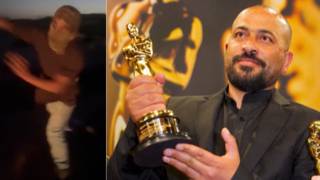

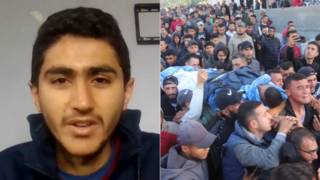
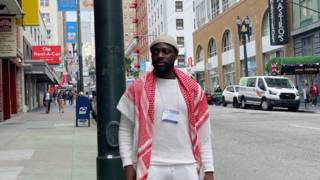





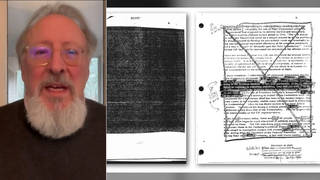
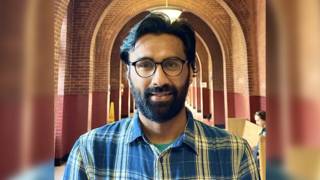
Media Options